英国历史学家和著名作家Terry Breverton编撰的《不朽遗言》(Immortal Last Words)一书中共收录了370位历史名人的临终遗言。我们选取了其中的八位文学巨匠,看看他们在人生的最后一刻都说了些什么。他们的话或惊世骇俗,或朴实无华,道尽了这些文人的半生痴狂半生癫……
We select some of literature’s most memorable farewells, from Byron to James Joyce.
我们挑选出一些文学界最令人难忘的临别之言,从拜伦到詹姆斯·乔伊斯。
“Come, come, no weakness; let’s be a man to the last!”
“来吧,来吧,别软弱。让我们像男子汉一样死去!”
——LORD BYRON1) (拜伦勋爵)
 Byron was attended by two young doctors on his death bed in Missolonghi. Faced with the terrible problem of treating a world-famous figure for an illness which neither knew anything about, they fell back on2) the usual treatment of the time—to bleed the patient and so reduce his fever. Byron resisted, saying that there had been “more deaths by lancet3) than by the lance4)”, but gave in when warned that the disease could “deprive him of5) reason”. The weakened poet sank into unconsciousness and died under his terrified doctors’ hands.
Byron was attended by two young doctors on his death bed in Missolonghi. Faced with the terrible problem of treating a world-famous figure for an illness which neither knew anything about, they fell back on2) the usual treatment of the time—to bleed the patient and so reduce his fever. Byron resisted, saying that there had been “more deaths by lancet3) than by the lance4)”, but gave in when warned that the disease could “deprive him of5) reason”. The weakened poet sank into unconsciousness and died under his terrified doctors’ hands.
拜伦临终前在迈索隆吉翁,由两位年轻医生在他的病榻边照料。他们面临着一个棘手的问题:要诊治一位世界闻名的大人物,但却对他所患的病一无所知。于是他们决定采用当时惯常的疗法——给病人放血来让他退烧。拜伦起先不肯,说以往“死在手术刀下的人比死在长矛下的要多”。但当他被警告说这病可能会“让他失去理智”时,他妥协了。虚弱的诗人陷入昏迷,随后死在两位被吓破了胆的医生手中。
“I must go in; the fog is rising.”
“我得进去了,雾正在升起。”
——EMILY DICKINSON6) (埃米莉·迪金森)
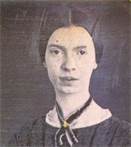 Dickinson’s health declined sharply over the last years of her life, until she finally became confined to her bed and was only able to write brief notes. According to her niece, Martha, her “briefest last message” was reminiscent7) of “an oft8)-repeated family caution, ‘it was already growing damp.'” Her physician gave the cause of death as Bright’s disease, a kidney ailment9) now called nephritis10).
Dickinson’s health declined sharply over the last years of her life, until she finally became confined to her bed and was only able to write brief notes. According to her niece, Martha, her “briefest last message” was reminiscent7) of “an oft8)-repeated family caution, ‘it was already growing damp.'” Her physician gave the cause of death as Bright’s disease, a kidney ailment9) now called nephritis10).
迪金森的健康状况在她生命的最后几年里急剧恶化,到最后她卧床不起,只能写些简短的笔记。据她的侄女马莎所说,她“最后的只言片语”是回忆起“家里人常嘱咐的一句话,‘湿气已经越来越重了。’”她的内科医生将她的去世归因于布赖特氏病,也就是现在被称为肾炎的一种肾病。
“What’s that? Do I look strange?”
“怎么回事儿?我看上去是不是有些异样?”
——ROBERT LOUIS STEVENSON11) (罗伯特·路易斯·史蒂文森)
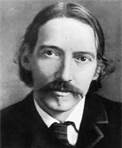 In poor health from 1880, Stevenson had settled in Samoa in 1890 to recuperate12), but probably died of a cerebral13) haemorrhage14). According to his biographer, “At sunset he came downstairs … talked of a lecturing tour to America that he was eager to make, ‘as he was now so well,’ … suddenly he put both hands to his head, and cried out, ‘What’s that?’ Then he asked quickly, ‘Do I look strange?’ Even as he did so he fell on his knees beside her. He was helped into the great hall … losing consciousness instantly, as he lay back in the armchair that had once been his grandfather’s …”
In poor health from 1880, Stevenson had settled in Samoa in 1890 to recuperate12), but probably died of a cerebral13) haemorrhage14). According to his biographer, “At sunset he came downstairs … talked of a lecturing tour to America that he was eager to make, ‘as he was now so well,’ … suddenly he put both hands to his head, and cried out, ‘What’s that?’ Then he asked quickly, ‘Do I look strange?’ Even as he did so he fell on his knees beside her. He was helped into the great hall … losing consciousness instantly, as he lay back in the armchair that had once been his grandfather’s …”
自1880年起史蒂文森的健康状况就不好了,1890年他搬到萨摩亚去疗养,而后去世,死因可能是脑溢血。他的传记作者回忆道:“黄昏时分他走下楼来……聊了聊他很想成行的美国巡回演讲,‘因为现在他的身体状况很好,’……突然,他双手抱住脑袋,叫道,‘怎么回事儿?’紧接着他又问,‘我看上去是不是有些异样?’他一边说着一边就跪倒在了她身旁。他被扶到了大厅……躺在曾经属于他祖父的扶手椅上,马上就失去了意识……”
“It’s a long time since I drank champagne.”
“我很久没有喝香槟了。”
——ANTON CHEKHOV15) (安东·契诃夫)
Terminally16) ill, he went with his wife Olga to Badenweiler. Later she recalled his dying moments: “Anton sat up unusually straight and said loudly and clearly (although he knew almost no German): ‘Ich sterbe (I’m dying).’ The doctor calmed him, took a syringe17), gave him an injection of camphor18), and ordered champagne. Anton took a full glass, examined it, smiled at me and said: ‘It’s a long time since I drank champagne.’ He drained it, lay quietly on his left side, and I just had time to run to him and lean across the bed and call to him, but he had stopped breathing and was sleeping peacefully as a child …”
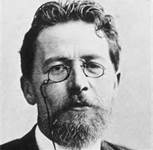 契诃夫在病重的后期和妻子奥尔佳一起去了巴登韦勒(编者注:德国的一处疗养胜地)。她后来回忆起他临终时的情形:“安东坐得异常地笔直,用洪亮且清晰的声音说(虽然他基本不会说德语) :‘Ich sterbe. (我要死了。)’医生帮他镇定下来,拿来注射器,给他打了一针莰酮减轻疼痛,并点了一杯香槟酒。安东拿起满满一杯酒,仔细看了看,微笑着对我说:‘我很久没有喝香槟了。’他把酒喝得干干净净,然后静静地朝左侧卧躺下,而我只来得及跑到他身边,俯身趴在床上喊他,可他已经停止了呼吸,像个孩子一样平静地睡去……”
契诃夫在病重的后期和妻子奥尔佳一起去了巴登韦勒(编者注:德国的一处疗养胜地)。她后来回忆起他临终时的情形:“安东坐得异常地笔直,用洪亮且清晰的声音说(虽然他基本不会说德语) :‘Ich sterbe. (我要死了。)’医生帮他镇定下来,拿来注射器,给他打了一针莰酮减轻疼痛,并点了一杯香槟酒。安东拿起满满一杯酒,仔细看了看,微笑着对我说:‘我很久没有喝香槟了。’他把酒喝得干干净净,然后静静地朝左侧卧躺下,而我只来得及跑到他身边,俯身趴在床上喊他,可他已经停止了呼吸,像个孩子一样平静地睡去……”
“Death, the only immortal19), who treats us alike, whose peace and refuge are for all. The soiled and the pure, the rich and the poor, the loved and the unloved.”
“死亡,这唯一不朽的永存,它对我们一视同仁,它的安宁和庇护是所有人的归处,无论这人是肮脏还是纯洁,富有还是贫穷,是否被人所爱。”
——MARK TWAIN20) (马克·吐温)
After suffering a heart attack in Bermuda, Twain went back to his Connecticut home to recover. Having predicted in 1909 that he would “go out” with Halley’s comet21)—which appeared in the year of his birth—he died the day after the comet’s closest approach to Earth. According to Albert Bigelow Paine he said “Goodbye”, and Dr Quintard, “who was standing near, thought he added ‘If we meet’—but the words were very faint.”
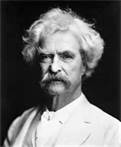 吐温在百慕大心脏病发作,后回到位于康涅狄格州的家中休养。他曾在1909年预言自己会和哈雷彗星一起“离去”——这颗彗星曾在他出生那年出现过——在彗星达到其最接近地球点的第二天,马克·吐温去世了。据艾伯特·比奇洛·佩因说,吐温说了声“再见”,而昆塔德医生“当时站得很近,认为他后来又说了一句‘如果还能再见的话’——但是这几个词说得很轻。”
吐温在百慕大心脏病发作,后回到位于康涅狄格州的家中休养。他曾在1909年预言自己会和哈雷彗星一起“离去”——这颗彗星曾在他出生那年出现过——在彗星达到其最接近地球点的第二天,马克·吐温去世了。据艾伯特·比奇洛·佩因说,吐温说了声“再见”,而昆塔德医生“当时站得很近,认为他后来又说了一句‘如果还能再见的话’——但是这几个词说得很轻。”
“We all reveal22) … our manifestations23) … This manifestation is over … That’s all.”
“我们都来这儿……走了一遭……现在已经走到头了……就这样吧。”
——LEO TOLSTOY24) (列夫·托尔斯泰)
Tolstoy left his estate, aged 82, to begin a new life as a peasant. Reaching the small town of Astapovo he contracted25) pneumonia26), and died a few days later in the stationmaster’s house. According to the stationmaster, his last words were: “But the peasants … how do the peasants die?” His friend Vladimir Chertkov preferred to remember something from the night before. “He was lying on his back, breathing heavily … and all of a sudden—as if arguing with himself—broke out in a loud voice: ‘We all reveal … our manifestations … This manifestation is over … That’s all.'”
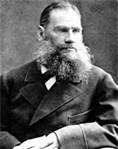 82岁高龄的托尔斯泰离开了自己的庄园,要去做个农夫,开始新的生活。在到达一个名为阿斯塔波沃的小镇时,他身染肺炎,几天后死在了火车站站长的家里。据站长说,托尔斯泰的遗言是:“可是那些农民……农民们是怎样死的呢?”他的朋友弗拉基米尔·切尔科夫却觉得他前一晚所说的一些话更值得被记住。“他仰面躺着,呼吸很重……突然——好像在跟自己争吵一样——他大喊起来:‘我们都来这儿……走了一遭……现在已经走到头了……就这样吧。’”
82岁高龄的托尔斯泰离开了自己的庄园,要去做个农夫,开始新的生活。在到达一个名为阿斯塔波沃的小镇时,他身染肺炎,几天后死在了火车站站长的家里。据站长说,托尔斯泰的遗言是:“可是那些农民……农民们是怎样死的呢?”他的朋友弗拉基米尔·切尔科夫却觉得他前一晚所说的一些话更值得被记住。“他仰面躺着,呼吸很重……突然——好像在跟自己争吵一样——他大喊起来:‘我们都来这儿……走了一遭……现在已经走到头了……就这样吧。’”
“I feel certain that I’m going mad again …”
“我觉得我又要发狂了……”
——VIRGINIA WOOLF27) (弗吉尼娅·吴尔夫)
Fearing that she was on the brink of28) the latest in a series of breakdowns, Woolf committed suicide by loading her pockets full of stones and wading29) into the River Ouse. Her suicide note told her husband that she would rather die than endure another such episode. “I feel certain that I am going mad again. I feel we can’t go through another of those terrible times. And I shan’t recover this time. I begin to hear voices, and I can’t concentrate. So I am doing what seems the best thing to do … I can’t go on spoiling your life any longer. I don’t think two people could have been happier than we have been. V.”
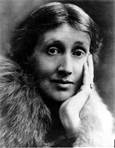 吴尔夫担心自己新一轮的精神疾病即将发作,于是在口袋里装满石头,走进欧塞河,结束了自己的生命。在遗书中,她告诉丈夫她宁愿死也不愿再忍受一次折磨了。“我觉得我又要发狂了。我觉得我们已无法再次熬过那些可怕的日子,而且我这次也好不了了。我开始幻听,没办法集中精神。所以我要做的看来是我所能做的最好的事……我不能再毁掉你的生活了。我相信不会再有任何两个人能像我们俩过去那样幸福。弗。”
吴尔夫担心自己新一轮的精神疾病即将发作,于是在口袋里装满石头,走进欧塞河,结束了自己的生命。在遗书中,她告诉丈夫她宁愿死也不愿再忍受一次折磨了。“我觉得我又要发狂了。我觉得我们已无法再次熬过那些可怕的日子,而且我这次也好不了了。我开始幻听,没办法集中精神。所以我要做的看来是我所能做的最好的事……我不能再毁掉你的生活了。我相信不会再有任何两个人能像我们俩过去那样幸福。弗。”
“Does nobody understand?”
“没有一个人懂吗?”
——JAMES JOYCE30) (詹姆斯·乔伊斯)
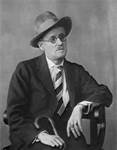 Joyce died in Zurich, two days after surgery for a perforated31) ulcer32). The Irish government declined his wife’s offer to repatriate33) his remains. According to Richard Ellmann, a Catholic priest tried to convince his widow that there should be a funeral Mass. She replied: “I couldn’t do that to him.”
Joyce died in Zurich, two days after surgery for a perforated31) ulcer32). The Irish government declined his wife’s offer to repatriate33) his remains. According to Richard Ellmann, a Catholic priest tried to convince his widow that there should be a funeral Mass. She replied: “I couldn’t do that to him.”
在接受了治疗溃疡穿孔的手术两天后,乔伊斯在苏黎世去世。爱尔兰政府拒绝了他的妻子想把他的遗体运送回国的请求。据理查德·埃尔曼所说,一位天主教牧师曾设法说服乔伊斯的遗孀为他举行一场葬礼弥撒。她回答道:“我不能对他这么做。”
1. Lord Byron: 拜伦勋爵(1788~1824),英国诗人,出身破落贵族家族。他反抗专制压迫,追求民主自由,在投身希腊民族独立战争时病逝。其代表作有《唐璜》等。
2. fall back on: (当其他手段不管用时)使用……的办法
3. lancet [ˈlɑːnsɪt] n. (外科用)柳叶刀,小刀
4. lance [lɑːns] n. 长矛
5. deprive of: 剥夺
6. Emily Dickinson: 埃米莉·迪金森(1830~1886),美国著名女诗人。她的诗作风格独特,多用意象,主题常涉及信仰和死亡。
7. reminiscent [ˌremɪˈnɪs(ə)nt] adj. 回忆往事的
8. oft [ɒft] adv. 常常,再三
9. ailment [ˈeɪlmənt] n. 疾病(尤指微恙)
10. nephritis [nɪˈfraɪtɪs] n. 肾炎
11. Robert Louis Stevenson: 罗伯特·路易斯·史蒂文森(1850~1894),英国苏格兰作家,著有小说《金银岛》《化身博士》等。
12. recuperate [rɪˈkuːpəreɪt] vi. 恢复,复原
13. cerebral [ˈserəbrəl] adj. 大脑的,脑的
14. haemorrhage [ˈhem(ə)rɪdʒ] n. 出血(尤指大出血),溢血
15. Anton Chekhov: 安东·契诃夫(1860~1904),俄国作家,短篇小说艺术大师,著有中篇小说《第六病室》、短篇小说《套中人》、戏剧剧本《樱桃园》等。
16. terminally [ˈtɜː(r)mɪn(ə)li] adv. (患病)晚期地
17. syringe [sɪˈrɪndʒ] n. 注射器
18. camphor [ˈkæmfə(r)] n. 莰酮,樟脑
19. immortal [ɪˈmɔː(r)t(ə)l] adj. 不朽的
20. Mark Twain: 马克·吐温(1835~1910),美国作家,以语言幽默见长,主要作品有长篇小说《汤姆·索亚历险记》《哈克贝里·费恩历险记》等。
21. Halley’s comet: 哈雷彗星,是人类首颗有记录的周期彗星。
22. reveal [rɪˈviːl] vt. 揭示,展现
23. manifestation [ˌmænɪfeˈsteɪʃ(ə)n] n. 某事存在的证据
24. Leo Tolstoy: 列夫·托尔斯泰(1828~1910),俄国作家、思想家,主要作品有长篇小说《战争与和平》《安娜·卡列尼娜》《复活》等。
25. contract [ˈkɒntrækt] vt. 感染
26. pneumonia [njuːˈməʊniə] n. 肺炎
27. Virginia Woolf: 弗吉尼亚·吴尔夫(1882~1941),英国女小说家、评论家,L. S. Woolf之妻,主张运用内心独白和意识流手法写作,代表作有长篇小说《海浪》《到灯塔去》等。
28. on the brink of: 濒于
29. wade [weɪd] vi. 涉水;跋涉
30. James Joyce: 詹姆斯·乔伊斯(1882~1941),爱尔兰作家、诗人,意识流大师,著有长篇小说《一个青年艺术家的画像》《尤利西斯》等。
31. perforated [ˈpɜː(r)fəˌreɪtɪd] adj. 穿孔的
32. ulcer [ˈʌlsə(r)] n. 溃疡
33. repatriate [ˌriːˈpætrieɪt] vt. 遣返